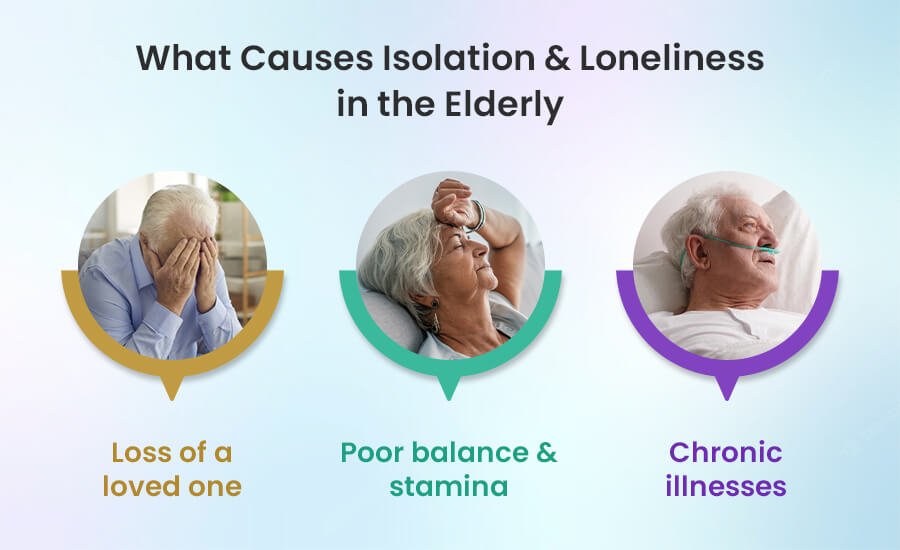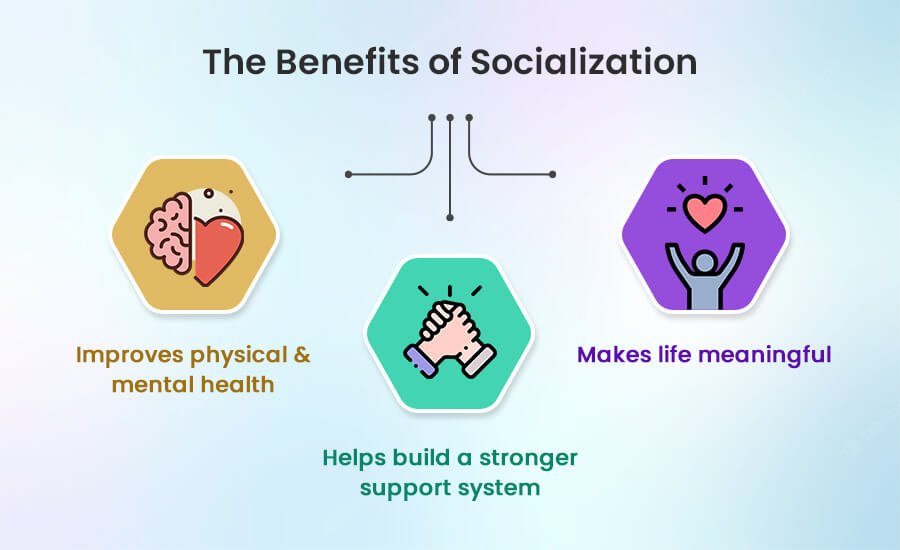In the United States, 27% of people over the age of 60 live alone. In comparison, fewer than 5% of senior citizens live alone in countries in Asia, Africa and the Middle East. Older adults around the world typically live with their extended family, but this is not the norm in the US.
Living independently is not a problem on its own. But for a good many senior citizens, it comes with its own share of challenges. Older adults that live alone are often vulnerable to social isolation, depression and helplessness.
With a rapidly ageing population, the number of people living alone in their 80s and 90s will only increase with time. While we can’t do much to prevent ailing senior citizens from living alone, we can try and help them overcome their loneliness.
Table of Contents
What Causes Isolation and Loneliness in the Elderly?

The most common reason for isolation and loneliness in the elderly is living alone. Here are some other reasons that poses a challenge to the mental wellbeing of senior citizens:
Loss of a loved one
Older adults are more likely to experience the loss of a loved one than people in any other age group. The loss of a spouse, friend, or child can be emotionally crippling. Each new loss can trigger hopelessness and make the elderly more vulnerable to loneliness and depression.
Poor balance and stamina e
People over the age of 60 often find that their balance and stamina is deteriorating. Senior citizens who once enjoyed sports and outdoor activities may find that they are unable to do them as they grow older. As a result, they resign themselves to a sedentary lifestyle, becoming socially isolated and physically weaker.
Chronic illnesses
About 95% of older adults in America suffer from at least one chronic disease. Diseases like arthritis and osteoporosis, to name a few, can severely restrict movement and affect the quality of life. Trained physicians at EliteCare Health Centers in Florida can help in managing chronic illnesses in the elderly. Many elderly people also suffer complications from fall-related injuries. These conditions can confine seniors to their homes for an indefinite period. In the absence of a spouse or family, ailing senior citizens may find themselves isolated and alone.
Failing health and physical strength can affect the social lives of the senior citizens greatly. An essential but often overlooked tool which can help them beat loneliness and depression is socialization.
The Benefits of Socialization

Improves physical and mental health
Research has found that lonely older adults were more likely to succumb to illnesses and experience functional decline than their socially active counterparts. Social support can motivate the elderly to eat well, exercise and abandon bad habits like smoking and drinking. All these positive behavioural changes can promote good physical health which in turn can curb depression and anxiety.
Helps build a stronger support system
Showing up for social events and participating in community-related activities can help them make more friends and acquaintances. This is especially useful for bereaved senior citizens. A wider social network is great for camaraderie and companionship, and it can also come in handy when people are struggling mentally or physically.
Makes life meaningful
Humans are inherently social. Each meaningful interaction with another person can bring immense joy and contentment. When older adults participate socially and give back to their communities, they feel a greater sense of purpose in their lives. These positive feelings of inter-connectedness can greatly improve morale and provide new meaning to senior citizens.
4 Ways Senior Citizens can Socialize

Connecting with family
It’s vital for older adults living alone to find ways to stay in touch with family members. Meeting children and grandchildren or even relatives can help alleviate the feelings of loneliness and isolation to a great extent. With new advancements in technology, it is now easier than ever to contact and stay in touch with loved ones living in faraway places. Learning how to use a cell phone or personal computer or a tablet can be especially beneficial for the aged confined to their homes. It’s important to tap into all available resources to be less cut off from the outside world.
Volunteering
Volunteering for a meaningful cause not only helps widen one’s social circle but also improves the circumstances of the less privileged people in the community. Lending help at a soup kitchen or teaching skills or trades enables elderly people to put their knowledge and energies to constructive use. Volunteering can cultivate a sense of belonging which people often lack – as they age and become lonely.
Organizing social events
Taking the initiative to plan and arrange social events for or with others can be a great way of meeting people over fun activities. Arranging game nights and mixers can provide the elderly with an opportunity to meet others from the same age group and stay in touch.
Finding senior centres
Senior citizens that lack the resources or opportunities to meet other people socially- can almost always find senior citizens centres. Being a part of such a community can help forge new friendships and motivate people to try activities that they never considered trying before.
Conclusion
Isolation and loneliness can cause immense harm to the physical and mental well-being of the elderly. Socialization, on the other hand, can protect them from the negative effects of living alone by giving them the strength to overcome certain challenges that affect them.
Making new friends and acquaintances is very rewarding at all ages but even more so as one grows older. Forging new connections and being part of the wider community can alleviate the loneliness and consequent pain and struggles. For detailed guidance, contact any primary care services for seniors.










